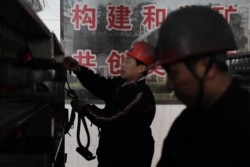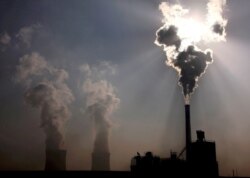U.S. climate envoy John Kerry warned Thursday that Beijing's coal-building spree could "undo" global capacity to meet environmental targets, after holding talks with top officials in China.
Tensions between Beijing and Washington have soared in recent months, with the two sides trading barbs on China's human rights record and its initial handling of the coronavirus.
Tackling climate change is among a handful of issues where the two sides had struck notes of harmony.
But Beijing has in recent months emphasized that environmental cooperation could be hurt by deteriorating Sino-U.S. relations.
Kerry told journalists Thursday evening that the United States has made it "clear that the addition of more coal plants represents a significant challenge to the efforts of the world to deal with the climate crisis."
Chinese plans for new coal plants could "undo the capacity of the world to reach net-zero by 2050," he said, adding that while they had "very constructive" talks, he also was "very direct" on the topic.
Despite pledges to reach peak coal consumption before 2030, then move toward carbon neutrality. China brought 38.4 gigawatts of new coal-fired power into operation last year — more than three times the amount brought online elsewhere in the world.
China has challenged the United States to fix relations with Beijing in order to make progress on climate change.
Kerry urged the Chinese government, however, not to let environmental cooperation be affected by tensions between the world's two biggest polluters, calling it a "global challenge."
"It is essential ... no matter what differences we have, that we have to address the climate crisis," he said.
Foreign Minister Wang Yi had told Kerry earlier in the visit that cooperation on global warming could not be disentangled from broader diplomacy between the two countries.
In a video call with the climate envoy, Wang accused Washington of a "major strategic miscalculation toward China," according to the ministry statement.
"It is impossible for China-U.S. climate cooperation to be elevated above the overall environment of China-U.S. relations," Wang said.
He added that "the ball is now in the United States' court, and the U.S. should stop seeing China as a threat and opponent."
'China can do more'
Kerry visited Japan earlier this week before traveling to the northeastern Chinese city of Tianjin, in a tour aiming to drum up support for a major global summit to tackle pressing climate issues.
The 26th edition of the U.N. Climate Change Conference of the Parties — COP26 — in Glasgow in November marks the biggest climate summit since the 2015 Paris negotiation.
Kerry said he plans to meet with his Chinese counterparts again before the summit, to push for stronger emission reduction commitments.
The U.S .envoy has repeatedly urged China to step up efforts to reduce carbon emissions.
"We have consistently said to China and other countries ... to do their best within their given capacity," Kerry said Thursday. "We think that China can do more."
The country is the world's current largest emitter of carbon dioxide, followed by the United States, which has historically emitted more than any other nation to date.
While Beijing has promised to reach peak carbon emissions by 2030 and become carbon neutral by 2060, it continues to be heavily dependent on coal, which fuels nearly 60 percent of its energy consumption.
"We have an opportunity to make a positive impact in Glasgow," Kerry said. "It really depends on the choices that China makes at this point."






